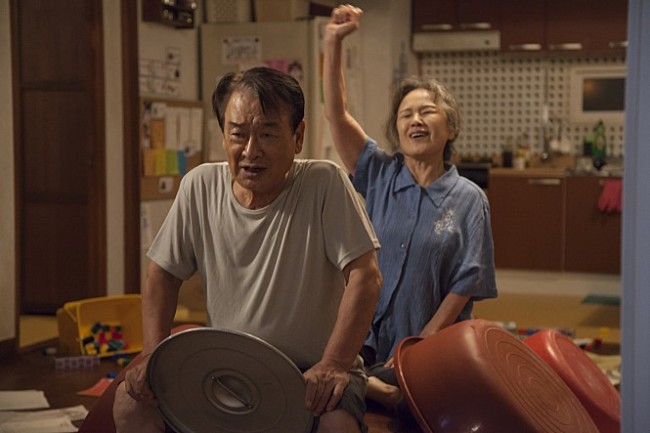[Herald Review] ‘Romang’ a beautiful story, but clumsy in telling
By Yoon Min-sikPublished : March 19, 2019 - 15:12
First impressions can be deceiving, but so can second and third impressions. Sometimes a film that looks promising from its opening scene will falter, only to rally with heartfelt moments of joy and grace.
Lee Chang-geun -- who took the helm of “Romang,” a romance featuring an elderly couple suffering from dementia -- did not show top-notch directing skills with his first feature film. But he delivered when it counted in the crucial moments depicting the couple’s love, care and companionship -- and so did these two truly great actors.
The film starts off by showing the family of Jo Nam-bong (Lee Soon-jae), a 75-year-old grumpy taxi driver who is extremely tough on his increasingly clumsy wife, Lee Mae-ja (Jung Young-sook), and their out-of-work live-in son. But Mae-ja finds out her clumsiness is due to dementia, and the disease slowly threatens the happiness she shares with her loving granddaughter Eun-ji.
Lee Chang-geun -- who took the helm of “Romang,” a romance featuring an elderly couple suffering from dementia -- did not show top-notch directing skills with his first feature film. But he delivered when it counted in the crucial moments depicting the couple’s love, care and companionship -- and so did these two truly great actors.
The film starts off by showing the family of Jo Nam-bong (Lee Soon-jae), a 75-year-old grumpy taxi driver who is extremely tough on his increasingly clumsy wife, Lee Mae-ja (Jung Young-sook), and their out-of-work live-in son. But Mae-ja finds out her clumsiness is due to dementia, and the disease slowly threatens the happiness she shares with her loving granddaughter Eun-ji.

The plan is to put Mae-ja in a nursing home, but Nam-bong has a change of heart and decides to look after her himself. But his son decides to move out after Mae-ja’s worsening condition nearly causes harm to Eun-ji.
Meanwhile, Nam-bong too is diagnosed with the degenerative disease. Left on their own, the elderly couple embark on a strange life journey, relying on each other and rekindling old feelings.
I liked the opening scene, but everything went downhill from there.
Every once in a while, what should be a television special gets made into a movie -- and that’s exactly how this film felt. The corny, rubber-stamp character development felt like a soap opera, and the set-up made the plot too obvious.
A lot of the time, a director goes over the top in depicting certain characteristics just to contrast them with the changes a character undergoes later on in a film.
This is what happened with Nam-bong, but I thought the casual wife-beater element was overdoing it. You don’t want to talk sense into this guy -- you want to call the cops.
It was the same way with Mae-ja, but in a different way. It is enough that she is a sweet, helpless old lady -- you don’t have to make her such a saint.
The film spent too much time building up the happy family that would eventually crumble, with by-the-book characters.
The film takes off in the second act, however, with a depiction of dementia and how it tears a family apart, even a loving family. The director seems to understand what the disease means -- not just medically, but what it does to a person, how it feels to gradually lose yourself and fade away into oblivion, how moments of tantalizingly short sanity can be that much more painful.
What holds up the predictable storyline is the powerful acting. The two leads, Jung and Lee, have reputations as good actors. They also work extremely well together and with others.
Lee, 83, is famous for always trying to improve himself and it shows in his performance. His facial expressions and the subtle changes in his voice depict the character’s anguish.
The scene where Mae-ja comes face to face with her husband’s condition was compelling -- the look of horror upon seeing her own disease mirrored in Nam-bong was captivating.
The undisputed highlight of the film is in the third act, when the couple take care of each other in their intermittent moments of sanity. When Nam-bong loses it, it is up to his spouse to care for him. When Mae-ja gets lost in her past, it is up to her husband to do the same.
They even leave little messages for each other when communication is impossible, which leads to some of the cutest back-and-forth banter.
Scene after scene, it was both adorable and heart-wrenching to see two vulnerable human beings managing to get little scraps of happiness out of the worst situation.
The movie was carpet-bombed with what one would call “sinpa” in Korean -- melodrama. I saw it coming from a mile away yet was crushed by it.
It is not a particularly good film, but the moments that work leave a strong impression. If any other actors had been cast in the lead roles -- especially if Lee hadn’t played Nam-bong -- the film would almost certainly not have worked. It’s a movie that shouldn’t have worked, but it did because it had so much heart.
One more thing: It’s a film meant for viewers with elderly parents and grandparents, not for viewers the same age as Nam-bong and Mae-ja. Even though it skimmed over the more terrifying aspects of dementia, watching what might become one’s own reality would be still too painful.
“Romang” opens on April 3.
By Yoon Min-sik
(minsikyoon@heraldcorp.com)








![[Graphic News] More Koreans say they plan long-distance trips this year](http://res.heraldm.com/phpwas/restmb_idxmake.php?idx=644&simg=/content/image/2024/04/17/20240417050828_0.gif&u=)
![[KH Explains] Hyundai's full hybrid edge to pay off amid slow transition to pure EVs](http://res.heraldm.com/phpwas/restmb_idxmake.php?idx=644&simg=/content/image/2024/04/18/20240418050645_0.jpg&u=20240419100350)






![[From the Scene] Monks, Buddhists hail return of remains of Buddhas](http://res.heraldm.com/phpwas/restmb_idxmake.php?idx=652&simg=/content/image/2024/04/19/20240419050617_0.jpg&u=20240419175937)

![[KH Explains] Hyundai's full hybrid edge to pay off amid slow transition to pure EVs](http://res.heraldm.com/phpwas/restmb_idxmake.php?idx=652&simg=/content/image/2024/04/18/20240418050645_0.jpg&u=20240419100350)

![[Today’s K-pop] Illit drops debut single remix](http://res.heraldm.com/phpwas/restmb_idxmake.php?idx=642&simg=/content/image/2024/04/19/20240419050612_0.jpg&u=)